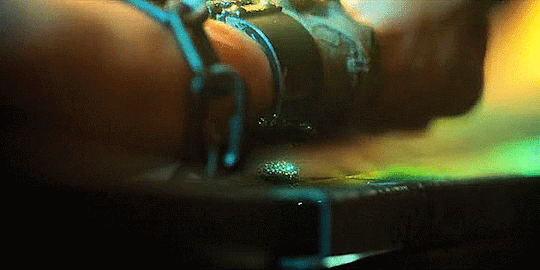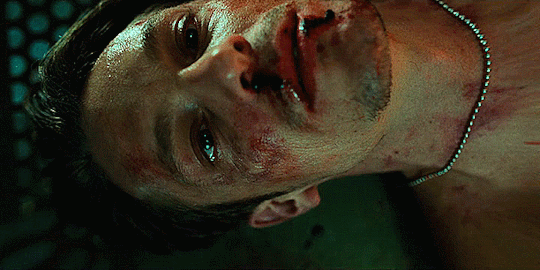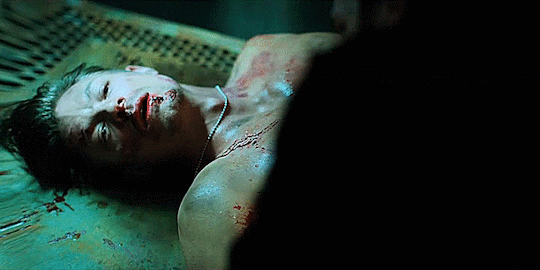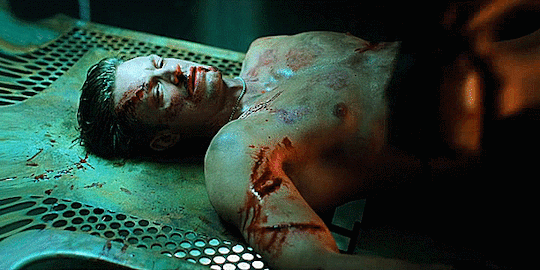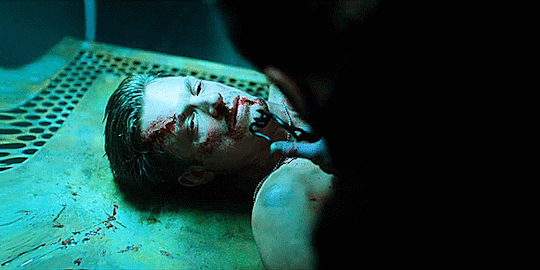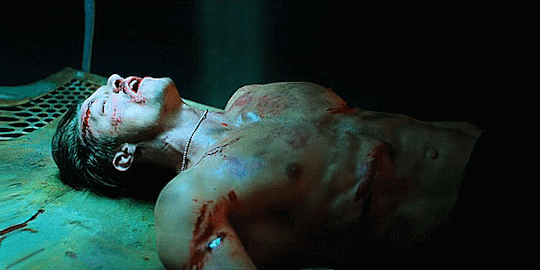A weekly event focusing on futuristic whump, hurt/comfort, medicine, and body-focused fiction. PfP is by Vladimir Manyukhin, header is Ari's.
Don't wanna be here? Send us removal request.
Text
By the time the alarms go off, he’s back on his feet, hoping the rover wasn’t filming, but knowing that it was—that his face-first sprawl on the surface of Phobos has been recorded for posterity. The visor’s fiber-optic display flashes ominously: suit breach. His body, or some small sliver of it, has been exposed to the raw, airless vacuum of a Martian moon.
An astronaut can die many ways, but decompression is one of the more gruesome. A punctured space suit means a race to sanctuary, before the envelope of pure oxygen surrounding the body bleeds away and hypoxia causes the person to black out. Rapid pressure loss isn’t explosive, but it’s ugly: Water in the body begins to vaporize and tries to escape, the lungs collapse, and circulation shuts down.
4 notes
·
View notes
Text
During the test, the hose that supplied air to his suit became detached, and LeBlanc was exposed to the effect of the vacuum for about 30 seconds. Fortunately, he was rescued from the vacuum chamber with almost no injuries, but if his rescuers had taken a little longer to reach him, he could have suffered severe health effects.
---
Sickbay Saturdays is temporarily on hiatus while I try to figure out what I'd like to do with it. While I do that, please enjoy (?) this article about the only time a human has been exposed to (and survived!) a rapid depressurization event. If you're writing someone getting thrown out of an airlock or having a catastrophic suit failure, this instance is the only comparable real-life case study we have.
#sickbay saturdays#whump#space#space history#space science#article#science#science fiction whump#whump plot bunnies
0 notes
Text
It’s Disability Awareness Month: Time for an Ableism Rant!
The fact there are real efforts to eliminate a complex mental condition that modern psychology doesn’t understand yet, just to avoid being forced to learn how to understand and accomadate it is actually sickening.
The fact that there are people (not just everyday people but fucking scientists and psychiatrists) out there that would rather have kids like my brother not ever be born/be normal (ie not be themselves at all) rather than be autistic is so wrath inducing to me.
It’s why I genuinely hate people that think Geordi LaForge being blind isn’t realistic.
No, a utopian future world isn’t one where we’ve eradicated blindness (and other non-lethal disabilities) for the convenience and comfort of able-bodied people.
A better future is one where we’re socially evolved enough to accomadate and gladly embrace one that wants to be a pilot or engineer, things that are incredibly difficult for a blind person to do now under the current technological and social limitations.
I also hate people (and Star Trek characters and writers 😡) that say Data doesn’t have emotions before he got his Emotion Chip!
Data absolutely did and expressed them constantly, just in a very neurodivergent Autism-coded way. The fact he expressed himself through art and that he even wanted to be Human in the first place proves that. Something/someone with no emotions would’ve had no such motivations.
138 notes
·
View notes
Note
I'd there anything that you'd like a prosthetic limb to be able to do? Like something that's not on the market but you could slip on to accomplish a task and then easily remove before it gets cumbersome?
I'm sorry i sat on this ask for so long, it's been very difficult to write an answer to this question that i feel is both honest and useful, but here's my best attempt at answering with what i consider to be an okayish amount of context...
I'm assuming you're asking because this post of mine blew up and got a lot of attention, and it looks like you're a maker that's keen on designing things to help disabled people and that's great! there are a lot of areas where products just don't exist but are of great help or need to people, and filling that gap is really really great! lots of people have lots of different needs, and many disabilities and situations can be helped with technological solutions, much of which need more development, both professionally and more grass roots.
but when it comes to my situation, ie upper limb amputee, i cannot stress enough: the problem is not prosthetic technology, the problem is other people, and ableism.
what i want people to focus on is that i can do almost everything i need to for myself without a prosthesis, using just my elbow, my nub (the soft squishy end of my residual limb), and a taking my time. a bit more awkward, a bit slower, more trips to the fridge and back, but i can do it. the things that i can't do myself, I'm lucky enough to have people to help me and happy to do so.
but what people actually focus on is prostheses, people love prostheses... so let's talk prostheses!
I have a myoelectric prosthetic "hand" - a big robot gripper that i can control with intentional nerve signals picked up via electrodes inside the socket that sits over my forearm; telling it to open and close on command, and controlling how fast it does so. the initial reason i wanted one was for soldering, because electronics is an on and off hobby i wanted to continue. I'm sure you know that through-hole soldering is at least a three handed job even for the regularly limbed, so i thought i needed it for that at least, and figured it would be handy (hah) to just wear all day for any task i might want two hands for.
well, in the four years of training and rehab and practice since... I'm fairly confident i don't actually need it for soldering, let alone anything else. my elbow grip and dexterity is good enough i can easily hold and aim a spool of solder without my prosthesis. i sometimes put it on to take out the trash, but that's just a time saver, it takes less trips and is faster than slinging bags over my nub arm. it has a little led flashlight in it that's useful at night outside sometimes? and as alluded to in the original post, it's got a small tip that can press little buttons that my nub can't, and that's the role i most often reach for it to fill.
but myo prostheses are a hassle to put on, often taking several attempts to get positioning right, it's hot and sweatty, there can be pressure sores, and it's real heavy in a way your shoulder never really gets used to. these are not really technological issues that need more research or smarts to solve, they're pretty fundamental limits of trying to attach any kind of medical devices to the human body. if i really had any big necessary use case for absolutely needing two hands, I'd go back to physical therapy and re-train to use a body powered prosthesis; the ones that secure with nice soft leather straps and use your opposing shoulder to control hook grip with tension wires. technology that hasn't changed in several centuries because we kinda already perfected it... it's low tech, reliable, has built in proportional control and feedback, and never features in science fiction because it's just not cool enough.
so why do i still bother? why keep my prosthesis, maintain it, have the socket padded so it keeps fitting, continue the slightly painful muscle control exercises instead of letting them atrophy and the damn robot hand sit on the shelf forever?
the problem is other people, and ableism.
when I leave the house in my natural body, nub on display for all to see (under an arm warmer because perpetually cold stump is a problem seemingly every amputee has to deal with)...
people stare. they notice me from a distance, no matter what i wear, how i carry my body. but it's not just staring. it's glaring, it's disgust, it's fear, it's dehumanisation. i have people recoil in horror, cross the street to avoid me, pull their children close to their bodies as if they might start dropping limbs if they get too close. people have stopped me in the street, from behind, demanding to know "what happened", I've had to get off trams at random stops to escape little old ladies insisting i disclose my highly traumatic medical history and that I'm being rude and uncooperative for not "educating" them on "such a fascinating curiosity"... or best yet, the one all my wheelchair using friends know inside out: forceful unwelcome "help" from strangers without even a hello, yet alone an ask. i once had a man leap to his feet and begin thrusting his hands towards my crotch because i wedged a water bottle between my thighs to unscrew the cap and he decided i was clearly incapable of doing it myself... and this isn't even getting into the ways that medical professionals treat me differently.
i go outside in my natural body, and I'm treated as a freak.
you know what happens when i go out wearing my prosthesis? children smile, adults mind their own goddamned business, leave me alone, and at absolute worst I've had a total of two people in four years talk to me about it, politely introducing themselves before saying "that's neat, how does it work?"...
because fiction and futurism have given people so many deeply ingrained fundamental ideas about prostheses and amputation that I am treated more like a human being while wearing a bulky robot claw with electrodes pressed into my skin, than when i dare to exist as i now naturally am.
this is also borne out by the hundreds of notes on my original post declaring we need to invest more, research more, design more, so that prosthetic technology is better and "works" and is cooler... and literally nobody asking why a piece of technology was designed in such a way that i needed to use my nose, needed to hold two buttons down simultaneously half a meter apart that are barely fingertip sized, when either of them being a toggle would work - a firmware fix that would take 30 seconds to implement if anyone actually thought about the real technological needs of limb different people, instead of scifi fantasies about improving prosthetic technology until its "indistinguishable from the human body", as if that goal should be self evidently desirable.
the actual technological solution to this situation, by the way, is a bracelet with a chopstick glued to it.
so.
*deep breath*
I'm sorry this was long and angry, I hope you can sense that my anger isn't directed at you, the question asker, but broadly at everyone and the way society perceives amputees/limb different people... and I hope anyone who reblogged my original post also shares this, because damn did tumblr miss the point of it!
to finish off, I'll give you the snippy snarky bitch response i originally had in consideration, before I decided to spend several hours on paragraphs of furiously slow one-thumbed attempt at shifting my audience's perception of prostheses... because legit it's great that you want to know how things can be improved for disabled people through technology! it's just that in this one particular case...
if you want to design some technology that would be most helpful to me but is totally absent from the current market, I'd like a portable pocket sized device that projects a psionic field to make ableds mind their own fucking business and just treat me like a human being when i go outside :3
2K notes
·
View notes
Text
Imagine if your dentist applied their years of experience working on mouths like yours to develop, say, teeth weaponry for the military. Inside American prosthetist offices, this is actually a fairly common relationship. The revolving door and entangled history between the prosthetics and orthotics industry and the military has forced patients like me into a cycle of design that creates high tech arms for American veterans on one side and death and mutilation on the other. The intention is that future soldiers wearing this technology would be better at destroying enemies— creating more disabled people who will likely never receive a prosthesis. A crucial part of this cycle is the industry’s fixation on developing new, expensive, electronic prosthetic devices for veterans, who receive them from the government at no cost. Yet the vast majority of people who experience limb loss in the United States not only never receive these devices, they aren’t veterans at all.
4 notes
·
View notes
Link
Just saw this episode recently and I had mixed feelings about how it approached disability issues, so I read some reviews on it. This one is pretty good. I learned about the “social model of disability”, which I’d never heard of before (c’mon, tumblr, you should’ve taught me this before now!).
10 notes
·
View notes
Link
On the issue of making space a universally accessible place, Fernandes was blunt.
“You need to make space inclusive right now, or we [disabled people] will sue you for it,” he told me. “I will personally sue you for it. You are not leaving this planet without us,” and that’s because “we have the right stuff—the right stuff that will allow your missions to last longer, and to allow the people that you send up there to survive longer, even when they get new conditions,” Fernandes said. “Disability will happen regardless of which planet you’re on,” he said. “You speak to experts here—people with disabilities—because that will allow you to plan for all that’s out there.”
261 notes
·
View notes
Text
Just to clarify: many things in the queue for today are from disabled authors writing about their experiences in ways that intersect with SF themes.
Today’s topic is disability in science fiction.
#I don't want to cause confusion with the SF tag#this is IRL reference / thought material / research for SF writers
2 notes
·
View notes
Text
Today’s topic is disability in science fiction.
2 notes
·
View notes
Text

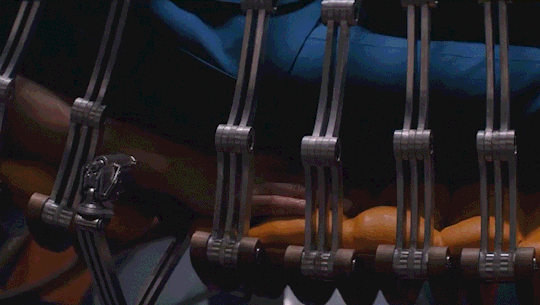

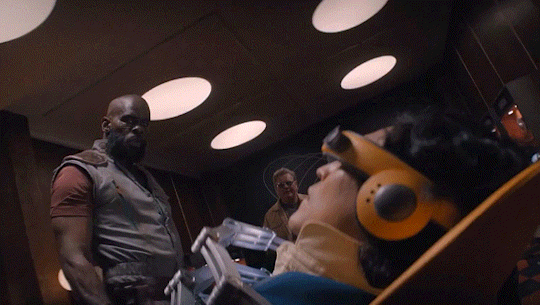

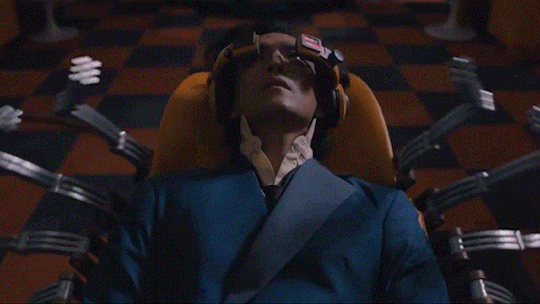
Cowboy Bebop s01e06: A rogue AI digs into Spike’s brain, forcing him to deal with his deepest trauma in a loop.
“You take off the goggles, you fry his brain. […] The AI… it’s got him in a VR loop, attempting to capture his consciousness.”
103 notes
·
View notes
Text

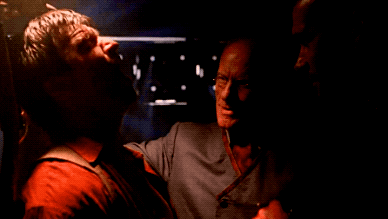
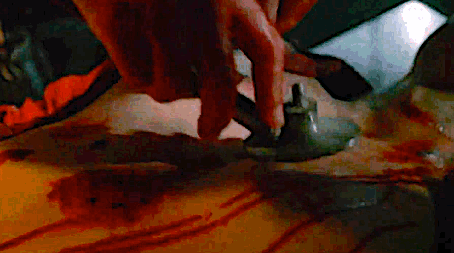

Firefly: S01E10
Firefly is one of my all time favourites. It's a shame that it has only one season, but every episode is pure gold. Captain Mal Reynolds is whumped several times an he is not the only one, but this torture scene in episode 10 is particulary intense.
Mal is captured by crime lord Nishka who wants to avenge himself of the crew's past grievances. He undergo severe torture. At the beggining he holds himself armed by humor and strong will, but Nishka is real sadist. After Mal has endured further torture without breaking down, Niska has a device affixed to Mal's chest which forces thin tendrils underneath his skin, causing extreme pain. The next scene in the torture chamber reveals that Mal has died. His tormentors revive him, leaving the weakened captain lying unrestrained on a table as they slice at him with wire cutters.
The episode has a happy ending, but I believe that Mal overstepped his limits. He has to have PTSD, even though it is not shown int the tv show. The cherry on top was the moment when Nishka brings Mal back to life with words "It seems you have died, captain." (I don't remenber it properly, I hope he use this words).
Great show, love Mal and Nathan Fillion ❤
40 notes
·
View notes
Photo



- No, no no, no wait!
867 notes
·
View notes
Text
Today’s topic is TORTURE!
59 notes
·
View notes
Photo

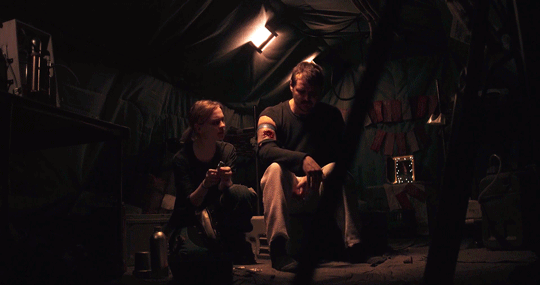


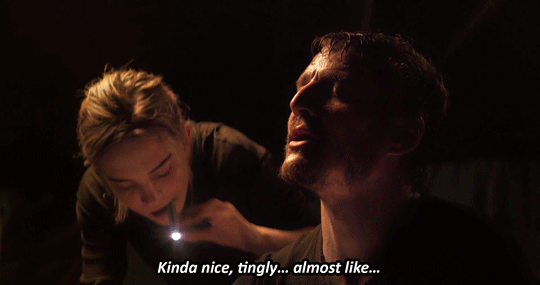

Does it hurt?
No. I don’t know. Keep goin’, you’re doing great. Keep goin’ until you hit bone.
Prospect, 2018.
416 notes
·
View notes
